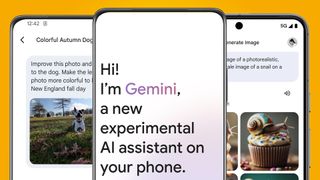Google isn’t done demonstrating the genius of Gemini and is working to integrate it directly into Android devices
Google’s newly reworked and renamed family of generative artificial intelligence models, Gemini, may still be at the very beginning of its development journey, but Google is making big plans for it. It plans to integrate Gemini into Android software for phones, and it is predicted that users will be able to access it offline by 2025. according to a top executive at Google’s Pixel division, Brian Rakowski.
Gemini is a set of major language models that are designed to understand and generate human-like text and more, and the most compact, efficient model of these is Gemini Nano, intended for on-device tasks. This is the model currently built and customized for use on Pixel phones and other capable Android devices. According to Rakowski, the larger models of Gemini Nano, which require an internet connection (because they only live in Google’s data centers), are expected to be integrated into new Android phones starting next year.
Google has been able to do this thanks to recent breakthroughs in engineers’ ability to compress these larger and more complex models into a size that was feasible for use on smaller devices. One of these bigger siblings is Gemini Ultra, which is considered a major competitor to Open AI’s premium GPT-4 chatbot, and its compressed version will be able to run on an Android phone without any additional help.
This would mean that users could get access to the processing power that Google offers with Gemini regardless of whether they are connected to the internet or not, potentially improving their daily experience with it. It also means that anything you enter into Gemini doesn’t necessarily have to leave your phone for Gemini to process (if Google wants it, that is), making it easier to keep your input and information private – having cloud-based AI tools is criticized in the past for inferior digital security compared to locally managed models. Rakowski told CNBC that what users will experience on their devices will be “instantaneous with no connection or subscription required.”
A potential game to win the favor of users
MSPowerUser points out that the smartphone market has cooled off lately and some manufacturers may be trying to grab the attention of potential buyers by offering devices that can take advantage of what modern AI has to offer. While AI is an incredibly rich and intriguing area of research and novelty, it may not be enough to convince people to trade in their old phone (which may already be able to handle something like Gemini or ChatGPT) for a new one. Right now, AI creators are hoping to raise trillions of dollars in funding probably to offer versions that can run on existing devices so people can try it for themselves, and I suspect that satisfies most people’s AI hunger at this point.
Google, Microsoft, Amazon and others are all trying to develop their own AI models and assistants to be the first to reap the benefits. At the moment it seems that AI models are extremely impressive and can be surprising, and that they can help you at work (although caution should be exercised if you do this), but their initial novelty is currently the biggest appeal they have .
These tools will need to demonstrate continued improvements in quality of life to be significant enough to make the impression they want to make. I believe that steps like making their models widely available on users’ devices and giving users the option and ability to use them offline is a step that could pay off for Google in the long run – and I would like to see other tech giants follow in his path.

